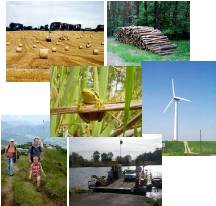Summary
What impact will land-use policies have on regional sustainability in Europe?
Summary
The ‘Sustainability impact assessment tools for multifunctional land use’ (SENSOR) delivered sustainability impact assessment tools (SIATs) to help European policymakers understand how existing and proposed policies may affect land use at the regional level throughout Europe.
Key outputs
- A suite of sustainability impact tools for European Commission officials to use as part of their impact assessment processes
- Development of a framework for participatory impact assessment (FoPIA) – used to assess the impacts of bioenergy policy and biodiversity policy in several regions
- Recommendation of FoPIA to the European Commission as a powerful method for stakeholder-inclusive sustainability impact assessment of land-use policies
Our involvement
Forest Research led the analytical evaluation of stakeholder participation in impact assessment processes. The team worked with local, regional and EU level stakeholders to identify relevant sustainability issues and scope out participatory approaches to impact assessment. Forest Research also helped to test and develop the Sustainability Impact Assessment Tools (SIATs).
Building on its expertise in stakeholder engagement, Forest Research explored new ways to work with local interest groups to involve them in the high level EU impact assessment process.
Publications
- Book – “Sustainability impact assessment of land use changes” (Springer, 2007)
- Morris, J. B., V. Tassone, R. De Groot, M. Camilleri, and S. Moncada. 2011. A Framework for Participatory Impact Assessment: involving stakeholders in European policy making, a case study of land use change in Malta. Ecology and Society 16(1):12.
Funders and partners
![]()
Funded by the EU Sixth Framework Programme
The project involved 33 partners from 15 countries
Status
2004-2008
